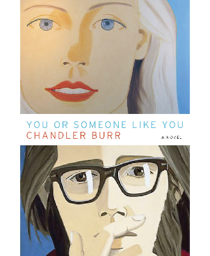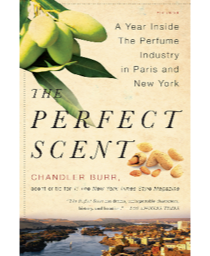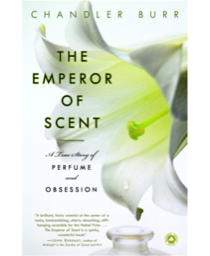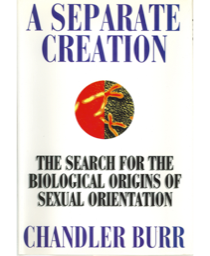You or Someone Like You | “Smart, literate, and humane, Chandler Burr’s debut novel deftly melds an entertaining tour through a Who’s Who of Hollywood and the culture of the moment with an original investigation into the timeless themes of great literature and the painful, private fault lines of deep marital love. In the process, he creates a heroine that few readers will forget.” — John Burnham Schwartz, author of The Commoner and Reservation Road “You Or Someone Like You is a pitch-perfect, often very funny novel about why, in this crazy world, we still bother to read. It’s for anyone who defiantly clings to the belief that a book can change our lives.” — David Ebershoff, author of The 19th Wife and The Danish Girl Anne Rosenbaum leads a life of quiet Los Angeles privilege, the wife of Hollywood executive Howard Rosenbaum and mother of their seventeen-year-old son, Sam. Anne and Howard met decades ago, studying literature at Columbia-she the daughter of a British diplomat from London, he a boy from an Orthodox Jewish neighborhood in Brooklyn. Now, on sleek blue California evenings Anne attends halogen-lit movie premieres on the arm of her powerful husband. But her private life is lived in the world of her garden, reading books. When one of Howard's friends, the head of a studio, asks Anne to make a reading list, she casually agrees- though, "Anne," a director reminds her, "no one reads in Hollywood." To her surprise, they begin calling: screenwriters, producers from their bungalows, and agents from their plush offices on Wilshire and Beverly. Soon Anne finds herself leading an exclusive book club for the industry elite. Emerging gradually from her seclusion, she guides her readers into the ideas and beauties of Donne, Yeats, Auden, and Mamet with her brilliant and increasingly bold opinions. But when a crisis of identity unexpectedly turns an anguished Howard back toward the orthodoxy he left behind as a young man, Anne must set out to save what she values above all else: her husband's love. At once fiercely intelligent and emotionally gripping, "You or Someone Like You" illuminates the dark fault lines dividing inherited faith from personal creed and, through the surprising transformation of one exceptional, unforgettable woman, illuminates literature's power to change our lives. This smart and provocative novel explores the idea of what it means to belong to a group, setting the tone of the story through a high-powered Hollywood book club. Raising lots of tough issues - of faith, religion, culture and literature - it may inspire the most meaningful discussions your own book group has ever had. —www.stylesubstancesoul.com Chandler Burr's debut novel, You or Someone Like You, is a must-read for any book group serious enough to spend more time discussing the book at hand instead of what wine to serve during the meeting. Burr's novel is about such a serious book group...formed in Hollywood of all places.... — Maureen Corrigan, NPR It’s a common joke that nobody reads in Hollywood. But what if literature suddenly became a trend, with industry players clamoring to get into an exclusive book club run by the wife of a major studio bigwig?.... — Sean Kennedy, Time Out New York, “Chandler Burr’s controversial Hollywood novel” | When Chandler Burr was 23 and backpacking around the world, he made a last stop in Israel. At the Western Wall, he was approached by “a young, shortish man....wispy beard, a little overweight, white and blue knit kippa” who asked, “Are you Jewish?” Burr said, “Yes.”.... — Craig Teischer, Publishers Weekly The first novel by Chandler Burr...is bound to generate chatter—not only because it features cameos by practically everyone in the New York publishing world (from David Remnick to Claudia Roth Pierpont) and several from Hollywood (Bryan Singer), but also because of the delicate subject at the center of its plot. Narrator Anne Rosenbaum is an immediately fascinating character, sharp-tongued and well read..... — Becky Ohlsen, BookPage “You or Someone Like You” may be set in ¬Hollywood, but it is a serious book: It suggests the literary scope of Harold Bloom and the thematic concerns of Bernard Malamud....[and of] the ideas [Burr] tackles in his novel...not least among them is Anne’s belief that exclusionary ethnic, racial and religious pride can be a form of bigotry.... — Steven Zeitchik, The Wall Street Journal A savvy novel that deals with Hollywood from a cultural rather than a tabloid perspective. — Kirkus, Starred Review "This is a wonderful novel; interesting, courageous and powerfully written.... To [believe] that unchosen traits (race, ethnicity, nation, tribe, gender, disabilities...) obligate one to a specific form of life is "essentialism". In pre-urban times essentialism would cement tribal loyalties..... Today it can sometimes create a sense of belonging... no matter how philosophically dubious the underpinnings of that belonging are. [O]n the whole I (and our novel's hero Anne Rosenbaum) can think of no idea in human history that has caused more conflict, exploitation and misery than has essentialism. ....Burr's treatment of the issues of self-identity, essentialism and the intimate troubles they cause is more powerful than Zadie Smith's in On Beauty.... Anne Rosenbaum is one of the strongest and smartest woman characters, both as she is written and who she is, that I have encountered in recent literature.... This work will be disturbing to some, I have seen it characterized as a diatribe, and surely Chandler Burr will take some heat. But it is a novel that is highly recommended and has not received the notice it deserves." -John Mullen, professor emeritus of philosophy at Dowling College author of "Kierkegaard's Philosophy: Self-Deception and Cowardice in the Present Age. | |
The Perfect Scent | PARIS: JEAN CLAUDE-ELLENA NEW YORK: SARAH JESSICA PARKER When the New Yorker magazine sent Chandler Burr to Paris and inside the luxury goods maker Hermès, Burr began what would become a year of reporting on perfumer Jean-Claude Ellena. Ellena was starting the creation of a new Hermès perfume. He was an industry legend who could smell the difference between jasmine absolutes distilled in steel or in aluminum, but he was just assuming a position no one had ever occupied-official Hermès perfumer-and would be shouldering responsibility for the total restructuring and revival of the house's troubled multi-million dollar perfume business. Hermès had agreed to give Burr complete internal access to watch Ellena and its marketers create, from beginning to end, their next scent, which they would be launching one year later on the $31 billion perfume market. Such access had never been granted before. On the other side of the Atlantic, the New York Times asked Burr to profile the actress Sarah Jessica Parker, who had just signed a license agreement with Coty, Inc. to create her own scent. Parker was-with a mixture of excitement and fear-assuming a role she had never played before, that of perfume creative director. She was entering a risky, brutally competitive world. Parker and Coty invited Burr to come along . . . The Perfect Scent is Burr's behind-the-scenes report from the secretive, high-pressure, and virtually unknown scent industry, where he would spend an intimate year with two personalities-and their two perfumes-who could not have been more different. Ellena was creator of the hits First for Van Cleef & Arpels and Bulgari's Thé Vert; Parker was an American movie star. Ellena was building his scent by and for Hermès in Paris and in Grasse, France's traditional capital of perfume. Parker's fragrance was being made in New York City by one of the largest commercial producers of perfume in the world, Coty, Inc., a $3 billion corporation headquartered in a midtown skyscraper. Hermès' scent would be called Un Jardin sur le Nil. Sarah Jessica Parker's, Lovely. Burr attended corporate strategic meetings, sat in on confidential creative sessions, listened to financial briefings, and here he presents word-for-word conversations with the players in Paris and Manhattan, at every step of the process. The result is a remarkable work of reporting on both art and business, a journey through a secretive and astonishing industry, and a nuanced portrait of two people, Ellena and Parker, who both were setting out to create the perfect scent. | Publishers Weekly November 5, 2007 THE PERFECT SCENT By Chandler Burr *Starred Review* New York Times perfume critic Burr (The Emperor of Scent) follows the creation of two new scents-Un Jardin sur le Nil by French luxury house Hermès, and Lovely, a celebrity fragrance by Sarah Jessica Parker-in a kind of travelogue through the international perfume industry, "one of the most insular, glamorous, strange, paranoid, idiosyncratic, irrational, and lucrative of worlds." The former perfume was conceived by Hermès, informed by a trip to Egypt, then crafted by Jean-Claude Ellena, who represents a breed of "ghosts" known in the biz as perfumers. For the latter, Parker worked as artistic director of a corporate scent-making team. Burr illuminates perfumery's clash of cultures and values-French artistic purity versus American commercialism. Worldwide, this highly secretive industry's PR machine propagates several anachronistic myths. For example, it insists that perfume ingredients are naturally derived (the overwhelming majority are not, because of concerns about quality control, ecological impact and allergies, among others) and that the big names on the bottles are personally involved in creating scents (perfumers alone typically do this; Parker was a rare exception). Burr makes a strong case that this mythmaking works to the industry's detriment, and that inviting the public behind the scenes might help to reverse the industry's declining sales. Burr's is a thorough and often hilarious account of perfumery's colorful characters, the science and art of fragrance creation and the human experience of scent itself. (pub: Jan '08.) | |
The Emperor of Scent | "A brilliant, feisty scientist at the center of a nasty, back-stabbing, utterly absorbing, cliff-hanging scramble for the Nobel Prize. The Emperor of Scent is a quirky, wonderful book." -John Berendt, author of Midnight in the Garden of Good and Evil "The Emperor of Scent is a gem of a book - a suspense story about a man of super-human powers, justifiably arrogant, dangerously steeped in hubris, and a real-life hero. I tumbled into this story, immediately engrossed, and fell in love with Luca Turin, irreverent, witty, imaginative, determined, elitist without a trace of snobbery, and above all a creative genius. Chandler Burr is a magician himself. He strikes me as a man we should all be so lucky to have at a dinner party, weaving perfect asides (the story of Mrs. Rippard's strange smell disease and the molecular structure of Chanel 5 and L'Air du Temps) into this incredible cautionary tale for all who assume the scientific world exists in a sterile vacuum of indisputable test results." -Alexandra Fuller, author of Don't Let's Go to the Dogs Tonight Unpublished Excerpts | Kirkus Reviews Starred review (A star is assigned to books of unusual merit, determined by the editors of Kirkus Reviews.) "An elegant analysis of one man's work in deciphering the sense of smell. Raised in France, Luca Turin is happy to admit that "the idea that things should be slightly dirty, overripe, slightly fecal is everywhere in France." Given a stinky cheese, says he, Americans think, "Good God!"; Japanese think, "I must now commit suicide"; and the French think, "Where's the bread?" So perhaps it's not surprising that Turin should be captivated by the sense of smell, and, with his polymath background in science, arrive at a theory of how it works, the last sense to be cracked- though still to be universally recognized as such. But journalist Burr is a believer in Turin's theory, and he presents his work in the best possible light, even its rejection by the prestigious magazine Nature, whose referees' comments he nimbly dissects and hangs out to dry as a combination of stung egos and vested interests. The theory introduces a whole new wrinkle to what is known about molecular recognition, though the lay audience, happy to have made it through the intelligible science, will be happier still when the spotlight falls on Turin himself, an appealing and genuine maverick who, in bringing quantum mechanics to a physiological problem (and crossing covetously guarded frontiers), invited the wrath of academics, not to mention of chemists at the Big 7 producers of artificial scents, who might greet his smell-prediction algorithm much as the Luddites welcomed mechanization. (It's interesting to compare the openness of scientific inquiry in Russia and India with its equivalent in Europe and America.) Burr unravels the story, with all its beard-pulling and molecular blacksmithing, its megahertz and neurobiology, with grace, an eye for the intelligent human-interest angle, and a steady tincture of bright humor." Review of The Emperor of Scent in The New York Times | |
A Separate Creation | "What this book does, fascinatingly and with a lightness of touch, is to establish a series of demonstrable truths about sexuality and to argue vehemently on the side of this kind of research being carried out." -Mail on Sunday "Enthralling- unputdownable!" - Ray Olson, BookList Table comparing homosexuality vs. left-handedness | "Many of the views which have been advanced [here] are highly speculative, and some no doubt will prove erroneous; but I have in every case given the reasons which have led me to one view rather than another.... The great principle of evolution stands up clear and firm, when these groups of facts are considered in connection with others, such as the mutual affinities of the members of the same group, their geographical distribution in past and present times, and their geological succession. It is incredible that all these facts should speak falsely. He who is not content to look, like a savage, at the phenomena of nature as disconnected cannot any longer believe that man is the work of a separate act of creation.... We thus learn that man is descended from a hairy quadruped, furnished with a tail and pointed ears, probably arboreal in its habits.... "The main conclusion arrived at in this work... will, I regret to think, be highly distasteful to many persons.... But we are not here concerned with hopes and fears, only with the truth as far as our reason allows us to discover it. I have given the evidence to the best of my ability." -Charles Darwin, Chapter XXI, The Descent of Man, 1871 | |














